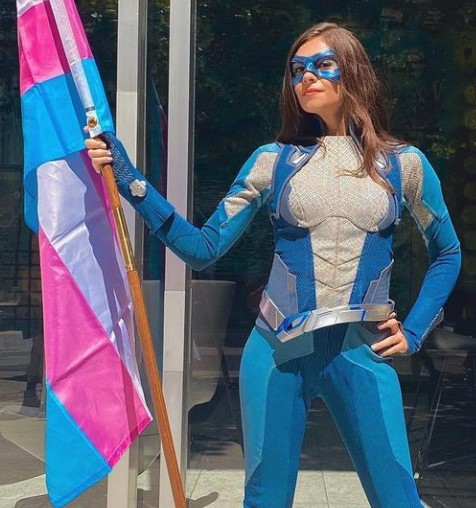In a shocking turn of events, there’s another discussion of Transgender Marxism . I’ll give you all a moment to contain your gasps.
For anyone new to this: Transgender Marxism is a collection of essays by, you guessed it, transgender Marxists, a PDF of which can be found here - https://transreads.org/wp-content/uploads/2021/07/2021-07-15_60f0b3d5edcb7_jules-joanne-gleeson-transgender-marxism-1.pdf
I’m hosting a discussion group on these essays, and so I’m sharing my initial read-through and note-taking with the online class (you).
I hope that we can spark a discussion, or at the very least that we can all learn a little something.
The discussion on the very lengthy intro (and links to all other essay discussions) can be found here - https://lemmygrad.ml/post/395378
Today’s essay is Encounters in Lancaster by JN Hoad.
JN Hoad is a femme de lettres, carer and communist in the North West of England. They are concerned with trans and queer care practices, and how these come to make change in the world. Their work has appeared in Salvage magazine, Blind Field and New Socialist.
Edit: the discussion continues with Zoe Belinsky’s essay here - https://lemmygrad.ml/post/437038


“But transition, like cruising, does not happen in a void. As we will see, there is a matrix of social relations which transition moves in. There is also a history to the flesh of each of our bodies that we bring with us to any social scene. A materialist approach to encounters should situate them in the fullness of the flesh and complexity of the matrix in which these interactions occur.”
This harkens back to our earlier discussions of Social Cognitive Theory and its integral function as a means of social reproduction of trans identity. Transition occurs as a process of interactions: the transitioner with other queer people, the transitioner with cis people. Interactions that shape not only the identity of the trans person through their understanding of the relation of body to gender, but also their perception by the other, and its function in shaping the outcome of such interactions.
“To be objectified by a detail as small as chipped pink nail varnish is a fairly typical example of the unwelcome gendering that femmes often experience. This small piece of my body snagged the whole encounter, opening something casually friendly to the prospect of harassment and intimidation, colouring the moment with an unspoken history of bullying, entitlement, and vulnerability. In the worst sense, this encounter could be called ‘gender affirmative’ – after all, he treated me like a woman. (Put another way: I was interpellated as a trans woman, and with it cast under the inherent suspicion of the straight gaze which attends that.) But therein lies the contradiction: between safely slipping past attention and being recognised for what one is.”
“I was queer unconsciously before I had any words to express it, and before I knew myself the more defensive straight boys at school were somehow already wise.”
You see people talk a lot about how trans people are “socialised” as the gender they’re assigned at birth, but that tends to be rarely true. Queer people (cis or trans) are often punished for their non-conformity long before they themselves have awareness of their queerness.
Built into the cisheteronormative system is a series of unwritten rules designed to sniff out and then “correct” queer behaviours, and so children who don’t have an understanding of queerness, children who haven’t learned the language to define what differentiates them, are subjected to this (often violent) corrective behaviour.
“Transition is that swerve away from cisstraightness, based on a gamble about what your full potential can be. Embodiment philosopher Gayle Salamon calls this process assuming a body: both the audacious leap of faith which initiates transition, and the refashioning of one’s body into something liveable and beautiful.”
“Social discipline treats othered, unremitting bodies as raw material, mere substance to be moulded, and so denies our agency and social life. Whatever your appetites, they can only be fed to you through the recognition of the state, managers, and forces of sexual control. From this view, the bodies which inhabit and make the world are featureless, except in as much as they must be disciplined, arranged, and put to useful work.”
“A ‘materialist’ analysis which sees only particles falling through the void regards individuals exactly as modern capital regards precarious workers.”
This is what I mentioned earlier: even those who seek to dismantle capitalism’s extreme exploitation and expropriation of labour as a value commodity fall victim to the mindset that sees bodies as resources devoid of the myriad physical and metaphysical needs and desires they experience.
There was an entire, really well-written, analogy to Pac-Man. Didn’t expect this essay to take that turn, but I enjoyed it. Pac-Man goes through the maze, doing his work of cleaning away the dots, consuming them but not digesting them: he is not a living body, merely a tool of labour. Hoad compares this to their time as a server, navigating the labyrinthine convention centre rooms, clearing away after the bourgeois, seen as nothing but a tool of labour, despite the human needs of their flesh.
In describing a queer community club event run by anarchists:
“A single photo captures this ecstatic matrix of encounters. From the stage, we look down upon the dancing crowd, packing the room front to back, the shadows and awkward angle making the venue seem cavernous and labyrinthine compared to its stumpy reality under the houselights. Limbs and faces form a warm, collective blur. The long digital exposure fills the air with coils and scratches of green, red, and white laser light, bouncing and spiralling among the performers. Charged particles of glitter falling in a void, orchestrated and expressive.”
“The same freedom fighter eventually takes me along to Antifa queer self-defence classes in Manchester. I learn to punch their gloved hands in full force hundreds of times. Those repeated exertions transform my body, its capacities and habits. As much as sex, dancing, or even hormones have. Over weeks of playfighting, I come to assume my body with confidence. Time was when leering straight men on an enclosed train, or handsy strangers on the dancefloor, would reliably cause a panic attack. Now I move confidently in the dark.”
Self-defence is so important, sometimes I wish that I was able to be more athletic. The confidence of knowing that you aren’t easy to over-power: transfeminine people are often criticised for strength or aggression, deemed as unladylike, but if it’s an option for you, please take it. Safety is more important than delicacy.
“We need a fuller account of how an encounter can constitute – or disrupt and shatter – bodies: how whole scenes, movements, cadres, riots, can have their origin and substance in the sudden, transformative appearance of strangers. In short, we need to be able to account for encounters like Mary Burns and Friedrich Engels, Marsha P. Johnson and Sylvia Rivera.”
Never said it wasn’t faultless, just laying out the author’s biases. Anyway, I managed to find the original source. It’s part of a set, most of which are more “human” like the one on the top. Presumably they tossed in this one because it kind of looked cool and artsy. The resolution is of course reduced to shit tier.
I had not noticed that you had already found the original source and I was trying to find it myself. I stumbled upon the image being used by Nature, here.
Nature is a very respected publisher. Even if they are not the original source of the image, I do think that them using this image as the main image in their COVID article can be used to support the original claim of the post.
Personally, I am inclined to think that the image was chosen because the authors thought that it “fit” the piece and not because of them being consciously part of a coordinated effort to make China look a particular way. But it is also true that they might have found it fitting in part due to the unconscious biases that they have collected over time - and the coordinated effort to make China look that way may have contributed. It can also be argued that a similar piece for any other country would feature an image with a similar feel because it matches the topic… Too many variables, it is hard to draw strong conclusions from this.
I do agree that Nature’s choice of that image without including others was inappropriate and did not accurately reflect the situation at the Institute. But at the same time, I don’t see it as proof of a conspiracy.
This kind of thing has been a theme for a while. Lots of western reporting on China uses tricks to distort things. This sort of thing isn’t artsy or accidental. It’s very much intentional https://www.globaltimes.cn/page/202102/1215710.shtml
Okay, but how does that fit in with the other 12 photos?
The other photos also look pretty negative to me as well, just not as egregious. For example, these photos evoke a sense of some kind of a glum police state, which is what most westerners believe China to be incidentally:
It reminds me all those shitty fake blue colored eyes that you can see in tons of cheap netflix series